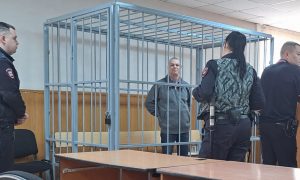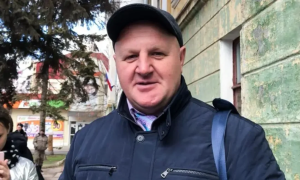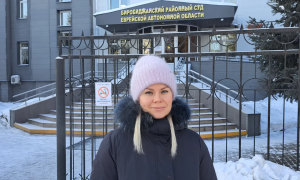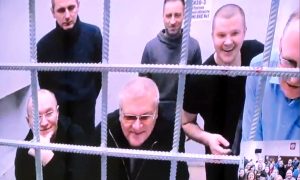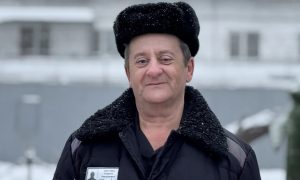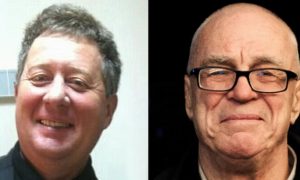| 9am |
In front of the Supreme Court, people are more than ever crowded. The line began to line up from the night. Many specially arrived from different cities of Russia. As the weather in Moscow is cold, most are dressed in winter. From time to time someone brought coffee and cakes for those standing in line. Police officers work professionally and in harmony, providing safety for the listeners of the process.  |
|---|---|
| 10:05 |
Females declare a petition for the attachment of fresh documents. He reports that in March-April 2017 law enforcement agencies throughout Russia, referring to the ongoing process, invade the liturgical buildings, demand that they stop, question the believers, and rewrite the passport data. Procuratorial warnings are issued on criminal liability for extremism in connection with holding meetings to study the Bible. Ministry of Justice objects to familiarizing. The court determines to attach. |
| 10:15 | The representative of the Ministry of Justice requests that the copies of the decisions of the CC’s Steering Committee on the appointment of members of committees of MPOs be attached to the case materials. According to the Ministry of Justice, these documents testify to the leading role of the Center. Representatives of the CA are left to the discretion of the court. In their opinion, this is unbearable evidence. Attorneys pay attention to the fact that some documents are dated 1998 and earlier (that is, before registration of the CA under the new law). In addition, the contents of the certificates fully comply with the Charter of the CA. Inquiries were issued due to the fact that the charter of the LRO was changing, so the certificates were issued to confirm that the persons indicated in them were still members of the LRO. The court determines to attach, with the exception of those that apply to the time before re-registration of the CA. |
| 10:25 | The court proceeds to examine the case materials. The first document is the statement of claim of the Ministry of Justice. The court again clarifies with the representative of the Ministry of Justice on what grounds the department asks to liquidate all LROs together with the Center. He asks whether the Ministry of Justice intends to clarify the claims. The Ministry of Justice does not intend to. Lawyers of the defendant pay attention that the property listed in the claim does not belong to the CA. |
| 10:35 | The court examines the document “The Fundamentals of the Doctrine and the Practice of Jehovah’s Witnesses.” Lawyers pay attention to the provisions on love for neighbor and tolerance (which directly contradicts the notion of “extremism”). They are also asked to read out the provisions that say that Jehovah’s Witnesses are trying to give their children a good education. |
| 10:40 | The Charter of the UC is being investigated. The court is interested in the question, are religious groups part of the structures of the LROs? How many unregistered groups? The lawyers explain that unregistered groups are part of the CA structure. The concept of “structure” in the “Law on Freedom of Conscience” is connected with the separation of religion from the state. Religions exist in accordance with their internal hierarchical institutional structure, to which the state does not delve. In this regard, the UC does not maintain legal documentation related to the activities of unregistered groups, and therefore can not provide official information to the court. |
| 10:47 |
The court announces a 10-minute technical break.     |
| 11:00 |
The study of documents is continuing. The court lists various court decisions. When the decision of the Rostov Regional Court of 2009 (on the Taganrog MRO) is investigated, the representative of the respondent Omelchenko draws attention to the fact that this decision was made before the decision of the plenum of the Supreme Court, which ruled what is extremism and what is not. For example, the Taganrog community, as well as the publication of Jehovah’s Witnesses by this decision were recognized for “undermining respect for other religions”, “refusing to use blood for medical purposes,” “refusing to fulfill civil obligations.” Also, a number of publications were considered extremist for having absolutely nothing to do with extremism. For example, the brochure “Jehovah’s Witnesses. Who are they? What do they believe in? “Was deemed extremist for mentioning that Jehovah’s Witnesses do not take up arms. There are other examples.
Â
|
| 11:10 am | Representatives of the defendant draw attention to the fact that the enumerated judicial acts were issued without involvement of the CA, therefore, they can not serve as evidence on the suit. |
| 11:15 | Novakov’s representative draws attention to the fact that at least one court decision, although the Ministry of Justice attached it to the case, was quashed by a higher court. |
| 11:20 | The Act of verification by the Ministry of Justice is being discussed. Lawyers draw attention to the unreliability of the Ministry of Justice’s conclusion that the UC hides information about imported literature. In fact, having provided more than 70,000 sheets of documents for examination to the Ministry of Justice, the UC refused to provide the information that the Ministry of Justice had to request from the customs authorities within the framework of interdepartmental cooperation. |
| 11:30 |
The representative of the Ministry of Justice draws attention to the fact that, according to one of the documents, more than 2,000 unregistered groups operate under the leadership of the UC. The lawyers explain that this is an internal spiritual structure. The court is interested in the representative of the Ministry of Justice, for what purpose they were attached to the business turnover balance sheet. The representative of the Ministry of Justice explains that the statements indicate that “money may have been sent to finance extremist activities.” The court asks, from which it can be seen that money was spent on extremist activity, rather than on ordinary statutory goals. The Ministry of Justice does not have exact data. The representative of Topors draws attention to the fact that, within the framework of the inspection, the Ministry of Justice provided all contracts for targeted donations of the Center, which provided the deciphering of the purpose of all financial transfers. The legal question of the representative: “Why did not the Ministry of Justice submit these documents to the court?” |
| 11:40 | Advocate Omelchenko to the representative of the Ministry of Justice: “Can you specify the amount, when, by whom was it spent and for what type of extremist activity?” The Justice Ministry has no information. |
| 11:45 | The documents that testify that the prosecutor’s office collected information about the property of believers are examined. Representatives of the defendant are interested in the representative of the Ministry of Justice, for what purpose this information was collected. Answer: for the purpose of confiscating property in the event that the court adopts an appropriate decision. |
| 11:50 am | Inspected letters and gratitude, issued by the authorities of the UC and MRO for help in the improvement of cities. The representative of the Ministry of Justice believes that Jehovah’s Witnesses are doing this for the purpose of “missionary activity”. Lawyer Zhenkov, referring to the representative of the Ministry of Justice: “Svetlana Konstantinovna, when it came to financing the LRO, you suspected extremist goals. When believers participate in helping the city, you again assume some kind of dirty trick. It can not be so! “ |
| 11:55 | Zhenkov draws attention to the State Religious Expert Examination of the Ministry of Justice, on the basis of which the UC was registered in 1999. Conclusions of this expertise are still in effect. An attempt to revise the conclusions of the competent expertise in the court session is unacceptable. |
| 12:00 | The following volumes of the case consist entirely of expert conclusions, about 70, which testify to the absence of extremism in the publications of Jehovah’s Witnesses. Many studies were conducted in the expert institutions of the Ministry of Justice. For example, Zhenkov, referring to the conclusions of the state expert institution, quotes from the book “Mankind in search of God” (included in the FEMC). The book says: “Studying different religions does not mean betraying one’s own faith. It can, on the contrary, strengthen itself when we see how other people sought the truth, and what it gave them. Knowledge gives understanding, and understanding – tolerance for people who have other views. “ Experts found no signs of extremism in the book, rather the opposite. Nevertheless, the book is included in the list of extremist materials. |
| 12:05 | The Ministry of Justice considers that these examinations have been carried out on the basis of lawyers’ requests, which means that they contain private opinions of experts. Omelchenko explains that this is not true: a significant part of the examinations were carried out at the request of the courts, law enforcement agencies and customs authorities. |
| 12:15 | The decisions and court sentences that came into force are being investigated, which testify to the absence of an extremist orientation in the publications of Jehovah’s Witnesses. Believers were prosecuted and, in fact, held in court for five years, and then were acquitted. Now they are again threatened with sanctions in the event that the claims of the Ministry of Justice are satisfied. |
| 12:17 | Representative Novakov: the flinging of extremist materials into the worship buildings of Jehovah’s Witnesses acquired the character of an epidemic in Russia. Novakov describes the events of September 20, 2016 at the station Nezlobnoye (Stavropol kr.), When law enforcers cut out the Bulgarian doors and placed extremist materials directly under the cameras of video surveillance. |
| 12:19 | Omelchenko: The Ministry of Justice did not take action to make expert conclusions on the literature of Jehovah’s Witnesses conducted in the south of the country not differ from the conclusions of the examinations conducted in the north. The Ministry of Justice did nothing (like the party that participated in the cases) to review the court decisions that had come into effect, on the recognition of the materials of Jehovah’s Witnesses as extremist. |
| 12:25 | The decisions of the European Court of Human Rights (ECHR) are being investigated. In connection with the fact that the ECHR gave legal interpretation to the refusal of the faithful from blood transfusion, a discussion on the transfusion of blood is again developing in court. The representative of the Ministry of Justice refers to the case when a child of Jehovah’s Witnesses died after a terrible accident, and also in case a child born with multiple pathologies died. The court asks the representative of the Ministry of Justice whether there is evidence of a causal relationship between the non-use of donor blood and the death that has come. Lawyers inform the court of what the representative of the Ministry of Justice is not telling: in both cases criminal cases have been initiated against the parents, extensive expert evaluations have been carried out to establish the absence of such a cause-and-effect relationship. Parents are justified for the absence of an event of crime. |
| 12:40 | The materials that testify to the fact that the believers applied to the competent authorities on the facts of falsification (riddles) are examined. |
| 12:45 | Decisions of the courts on the recognition of literature as extremist materials. It can be seen that the CA was not involved in the case (as well as representatives of the publishing house). Representatives of the defendant talk about double standards of state bodies. When it was necessary to recognize literature as extremist, the UCs were not allowed to take part in the case, but when the task is to eliminate the UC, it is attributed to the fact that the literature has been recognized as an extremist. |
| 1:00 pm | In the materials of the case there are DVD-discs with videotapes of flops. A spokesman for Novakov said that the materials would help to understand whether the UC has any relation to prohibited materials in local liturgical buildings or other persons are related to them. Discs will help to see the reaction of the believers themselves – how they react indignantly at the appearance of prohibited materials in the liturgical buildings. |
| 13:05 | Court: to what period of time do the videos belong? Novakov: the events in the village of Nezlobnoye date back to September 2016. Only thanks to the video recording, law enforcement officers refused to commit criminal charges against the LRO. Novakov describes the outrageous details of falsifications that have fallen into camera lenses in other Russian cities. |
| 13:10 | The court asks the representatives of the defendant whether all these facts have been appealed in the established order. And if so, are there any results. Representatives of the defendant confirm that they have been appealed and continue to appeal at the instance, but so far they have been unsuccessful. The court proceeds to examine other evidence without viewing the video. |
| 13:20 | The materials are already examined 24 volumes of the case. In total, there are at least 43 volumes in the case. |
| 13:25 | The court reads out the UC’s public statement that the UC has nothing to do with extremism. The application was originally posted on the website jw-russia.org . In this case, the court finds out who is the copyright owner of this site. Representatives of the CA report that the site belongs to the foreign “Watchtower Society”. The CA does not have a website, so the application was posted on the website of another organization of Jehovah’s Witnesses. |
| 1:30 pm | Several of the following volumes consist of acts of MRO checks by the justice authorities, but no violations of the law have been identified. The Ministry of Justice, in turn, asks to attach copies of various warnings and warnings issued to the LRO to the case materials. |
| 13:43 |
The court announces a break until 14:30.     |
| 14:40 | The hearings are continuing. Volume 39, which contains minutes of meetings of MPOs in different cities, is reviewed. The protocols detail the events related to the fling of extremist literature, as well as the measures that have been taken against the emergence of extremist literature in the liturgical buildings. |
| 14:45 | The Court draws attention to the fact that, according to the form, the minutes of the meetings of different MPOs are similar to each other. The court is interested in the question: is there an approved form for these protocols? In this connection, they are similar? Omelchenko explains that there is no approved form. The reason for their similarity is explained by the fact that believers communicate closely with each other. |
| 14:50 | The court again asks the defendant’s representatives whether they claim to challenge the court decisions that formed the basis of the claim. Lawyer Omelchenko makes it clear that we are not talking about a revision of these decisions. In this meeting, the court must evaluate these decisions, like any other evidence in the case, the degree of their relevance. |
| 15:02 | Color photographs are viewed – freeze frames of video materials, which testify to throws of extremist materials into the liturgical buildings. Representative Novakov draws attention to a single scheme, according to which flips were carried out across the country. |
| 15:07 | Another characteristic feature of planting is false witnesses. One example is the notarized evidence of the friendship of one of the witnesses with the FSB officer in the social network. |
| 15:08 | In the village of Kurdzhinovo (Karachay-Cherkessia), three believers were fined on the basis of false witness statements. Subsequently, these witnesses repented and gave a receipt that they gave knowingly false testimony under the pressure of law enforcement. Novakov points out that the receipt is available in the materials of this case. |
| 15:13 | Omelchenko draws attention to the court decision handed down in Voronezh. The court gave a correct assessment of the fact that the extremist materials found stuck under the carpet weighed on the floor were clearly planted. As the Voronezh court noted in its decision, the fact that the witnesses profess the same religion does not give grounds for doubting the authenticity of their testimony. |
| 15:16 | Omelchenko returns to the question, which was raised a little earlier, at 14:45. He shows the court a number of protocols of different MPOs. These protocols vary greatly in form. The court asks the representative of the Ministry of Justice whether the department has doubts that there are protocols that differ in registration. There is no doubt. The court also does not doubt. |
| 15:20 | The representative of Topors draws attention to the fact that the decision to liquidate the Birobidzhan MPO was made in the trial involving the same representative of the Ministry of Justice, S. Borisova. The CA was not involved in the case, as its rights are not affected. Therefore, it is surprising that in this process, the Ministry of Justice changed its position and applied the decision on Birobidzhan’s MRO to the UC. |
| 15:25 | The documents signed by various international and domestic bodies and organizations are examined and express concern about the application of anti-extremist legislation to Jehovah’s Witnesses. Omelchenko reads out the most characteristic excerpts from these documents, including appeals to the Russian Federation to stop the political persecution of believers. |
| 15:42 |
The court returns to the resolution of petitions previously claimed, but deferred. The representative of the Ministry of Justice asked to attach to the case 12 judgments that give doctors the right to use donor blood for the treatment of minors. Representatives of the defendant believe that these decisions are not relevant. First, the rejection of blood transfusion is not related to the notion of “extremism” (there are no other grounds other than extremist activity that the Justice Ministry does not provide for the prohibition of Jehovah’s Witnesses). Secondly, the UC was not a party to those court cases and is not even mentioned in any of the decisions. Thirdly, the introduction of these decisions affects medical confidentiality. To give them an assessment, you will need to seek the consent of patients, as well as their medical records. In all decisions, without exception, it is said that parents wanted to treat their children and applied to medical institutions. About the refusal of treatment was not discussed. Lawyer Zhenkov draws attention to the fact that the ECtHR ruling, which gives legal interpretation of the refusal of blood transfusions, gives examples of prohibitions in Islam and Orthodoxy that may be potentially hazardous to health. “However, the Ministry of Justice does not come out with a lawsuit to liquidate the centralized organizations of these religions,” notes Zhenkov. |
| 15:59 | The court refuses to include court decisions related to blood transfusion procedures. |
| 16:10 | The court decides on the attachment of copies of 28 acts of the prosecutor’s response, namely warnings and warnings issued against various MPOs. These acts were carried out for 6 years, not only during the last 3 years. |
| 16:20 | The court asks why the Ministry of Justice did not apply to local courts on these acts. The Ministry of Justice explains that the violations were minor or eliminated. Representatives of the respondent note that these acts are not connected with extremist activity. The court refuses to attach these acts to the case materials. |
| 16:22 | The court returns to the question of attaching a copy of the “internal” document of Jehovah’s Witnesses, received by the Ministry of Justice from “open sources” (from NTV’s website) to the case. Representatives of the CA confirm the authenticity of the text, explain the contents of this letter to the court, telling the order of believers’ voluntary donations. They explain to the court what the “councils of elders” are and who are the “district overseers”. Taking into account detailed explanations, the court decides to attach this document to the case materials. |
| 16:35 | In response to the statement by the representative of the Ministry of Justice that the decisions of the UC on the appointment of the chairmen of the LROs are imperative, the representative of Toporov draws attention to the wording “recommends as the chairman of the LRO.” |
| 16:36 | The representative of the Ministry of Justice asks to attach to the case an updated extract from the state register with an updated list of property of the UC and MRO. The court gives the defendants 10 minutes to get acquainted with the extract. |
| 16:38 |
A small technical break has been announced.   |
| 17:11 | The hearings are resumed. Representatives of the defendant, having read the extract from the register, comment that the extract is not current information, but information about the property that was once owned by the CA or the MPO, but was alienated. The Ministry of Justice explains that it was in this form that the data was provided by Rosreestr. The court decides to attach. |
| 17:16 | The court is interested in how the idea of ​​linking the MPO with the CA in the MPO statutes is formulated. To this end, he asks the parties if they have an example of an MPO charter. The Ministry of Justice does not. Omelchenko presents to the court a sample of the Charter of the IDOs of Jehovah’s Witnesses. The text of the charter states that the LRO is included in the “canonical structure” of the UC, belongs to the “religious confession of Jehovah’s Witnesses”. There is no wording “structural subdivision” (the term applied to political parties), on which the administrative plaintiff insists. |
| 17:29 | The court refuses the previously announced petition for viewing the video of the flops. |
| 5:30 pm | As there are no more petitions, the court announces the continuation of the hearings on April 20, 2017 at 14:00. |
- Saturday
- February 14th, 2026

